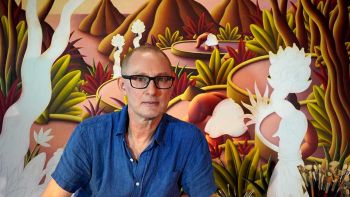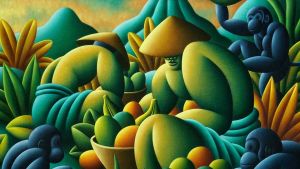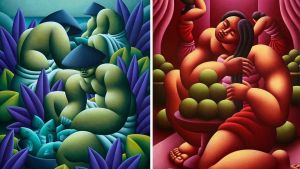Richard Winkler
- Full Name
- Richard Winkler
- Pen Name
- Richard Winkler
- Photograph by
- Link to Photograph
- www.richardwinkler.com
- Website for biography
- Place
- Related Music
- Related Books
- Related Scholars Articles
Biography
In English
Richard, how did your upbringing influence your artistic style?
During my childhood, I spent a lot of time with my grandfather, whom I admired. He was enormously talented in drawing and painting, and we spent a lot of time together. He also took me out into Nature, where we walked for hours, and he taught me everything about flora and fauna. He was a great inspiration, and he showed me how to draw and how to appreciate and love the natural world around us. During the same time, I had to spend a lot of time in hospital in order to undergo many surgeries to correct the growth of my bones, as I was suffering from a rare bone disorder. This created an early awareness of the physical body and its limbs. It was fascinating to me when the doctor measured angles and the length of my bones, and how he could open up my body to correct those after drawing lines on my limbs. In summertime, I usually spent a lot of time playing in an old garden and plant nursery near my home, forgetting all the pain I had to go through the rest of the year. I loved all the greenhouses, which were full of exotic plants and trees such as banana and orange trees. It was hot and humid, and I could smell the plants and the soil. This world was magical and full of energy and fertility. This was life, and life wanted to flourish. I often dreamt and fantasized about exotic and tropical worlds where my soul was happy and free, a kind of paradise where you picked fruits from the trees, and life was free from troubles. My early childhood drawings often depicted tropical landscapes with exotic colourful birds and animals.
What was your initial impression of Bali, and how did it inspire your art?
When I first landed in Bali, I discovered the world I had been dreaming about, a kind of Garden of Eden full of life and colours. The tropical nature was alive and amazing, and the soil so incredibly fertile. People were friendly, and everyone seemed to be able to talk about art and aesthetics. And everyone seemed to be creative in one form or another. Bali was full of life, colours, details, sounds, and smells. It really appealed to all my senses and made me feel incredibly alive. Even the ground was not stable and moved sometimes. I loved the passionate rains and thunderstorms, which were so intense and powerful. Life itself was at maximum in Bali, and I couldn’t feel anything but very alive. I loved it. Over time, I found lots of inspiration in the traditional life at the rice paddies, in Nature, and in markets. I love the simple life of man and nature, tightly integrated. Perhaps it’s still a dream in my mind about a Utopian world free of pain and sorrow. But it’s a beautiful dream, longing for peace and harmony in one’s soul.
Can you describe your creative process and how it has evolved over time?
During my time in art school, I became more and more fascinated by the human body. I spent countless hours drawing from life models to study the forms and lines of the body. I was especially fascinated by simple lines and how they cut and overlapped each other. I eventually started to play with these forms, stretching them and deconstructing them to my liking, a little bit like an orthopedic doctor rearranging the bones and limbs. The body doesn’t need to look anatomically correct to actually function and feel right. The important thing is that it feels good and works correctly. That’s how I construct the bodies on the canvas.
Do you see Bali as a colourful Utopian paradise?
I might dream about this Utopian paradise free of pain and sorrow and full of life, love, beauty and harmony. But of course this fantasy world doesn’t exist in reality. Wherever we live, life will always be life including everything from tears to laughter, and that’s how we grow ourselves and our characters. And maybe that is the real beauty and goal of life itself.In Balinese
In Indonesian
www.richardwinkler.com









Enable comment auto-refresher